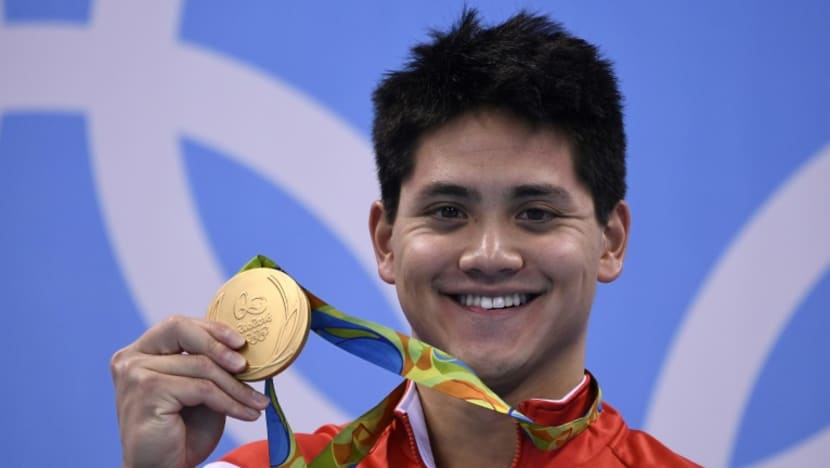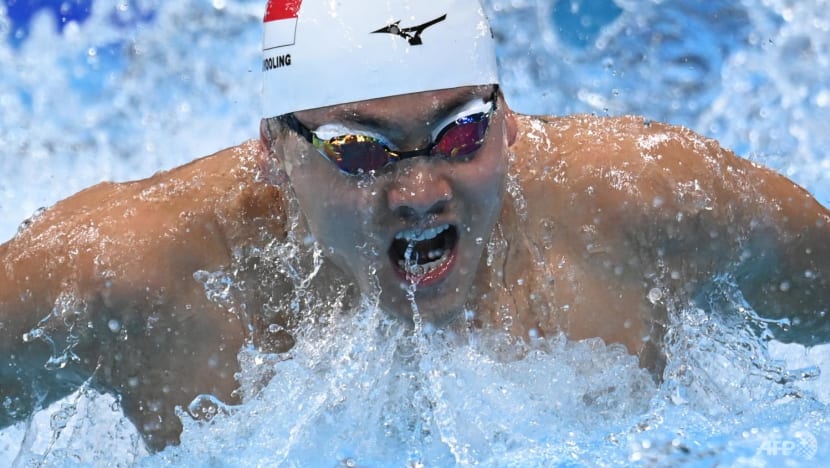Joseph Schooling gave Singapore belief, but what would it take to repeat his Olympic gold?
Based on interviews with the swimming fraternity, it's clear that replicating Schooling's historic Rio 2016 win would require a seismic shift, as CNA's Matthew Mohan finds out.

Singapore's Joseph Schooling won gold in Rio. (Photo: AFP/Gabriel Bouys)

This audio is generated by an AI tool.
SINGAPORE: On a Saturday morning in August eight years ago, a group of about 20 young swimmers crowded around a television at the Civil Service Club.
They’d usually be in the pool at this time, but their coach Marcus Cheah had made an exception. After all, he had a nagging suspicion that something special was about to happen.
“I kind of just knew that we were very likely to be in a position where we could watch history in the making,” recalled Cheah, a former national swimmer.
Over at the Chinese Swimming Club, two-time Olympian, three-time Asian Games bronze medalist and now coach David Lim had also arranged for his charges to catch the event after their morning training session.
Along with these young swimmers, many in Singapore watched awestruck as Joseph Schooling touched home first in the 100m butterfly final at the Olympics.
“It was a once-in-a-lifetime thing; being excited was an understatement,” recalled Lim, who runs a swim school. “They were all cheering and jumping and shouting after the race.
"It was very inspiring.”
THE BUTTERFLY EFFECT
Schooling, who till this day is the only Singaporean to win Olympic gold, announced last Tuesday (Apr 2) his retirement from competitive swimming.
Speaking to CNA, members of the local swimming fraternity said the 28-year-old’s legacy will be the belief his win gave others – but also that still more change is needed for another Singaporean to reach similar heights.
“The biggest message ... (was that) Singapore can do it at the highest level,” said Singapore Aquatics president Mark Chay.
Said Lim: “The win was the difference between reality and a dream. A lot of (young swimmers) still had the dream of making it but to … experience the reality is another level."
One of these was Nigel Low, who was six years old then and watching with his family at home that morning.
“I felt proud to be a Singaporean, listening to our anthem being played at the Olympics,” he said, adding that he and his older brother Kobe rushed down to a pool after Schooling's win.
“Joseph winning the gold medal at the Olympics has spurred me on to do my best during training and in every race,” said Nigel, whose goal now is to one day represent Singapore on the world stage.
General participation numbers in swimming have largely remained the same before and after Schooling’s win in Rio, with a Sport Singapore spokesperson describing these as "fairly consistent" since 2015.
According to findings in an annual survey by SportSG, swimming was ranked fifth (9 per cent) last year in top activities among participants aged 13 and above. Eight years ago, swimming was ranked third at 8 per cent.
Still, in the aftermath of Schooling’s gold, swim schools received a surge in enquiries, as coaches Cheah and Lim both attested to.
Singapore Aquatics also told CNA there was an increase in the number of its affiliates, which include swim schools and clubs, from 77 in 2016 to 102 in 2024.
The challenge for the national sports association is to advance those in “Learn to Swim” programmes to development and competitive swimming programmes, and overcome attrition, said Chay.
He said there was a big difference between the commitment needed for entry-level programmes and competitive levels, where training can be 10 times a week for six hours a day.
National head coach Gary Tan told CNA that the need to grow Singapore's talent pool has remained an issue, even after Schooling's win.
"We know that the pipeline is still not coming through so there's a lot of effort and emphasis placed on that department," he said.
Tan believes that support for athletes should be provided from an earlier stage, rather than it being retroactive after they achieve success and results.
"In the first two years (after Schooling's win) yes, there was a lot more support for us," he said.
"But it was as if people were just playing catch-up ... If we really want to take it seriously, it should start before that."
Tan pointed to the Sport Excellence Potential (spexPotential) scholarship, rolled out last year, as a source of help for junior athletes.

NO MAGIC FORMULA
When Cheah started coaching at the National Training Centre a year after Schooling's victory, he noticed something familiar when it came to the technique of some younger competitive swimmers.
“We saw it in terms of butterfly strokes, looking a bit like Schooling,” he explained.
Yet it might not be the best idea for a 10-year-old to emulate his style as a "lift-prominent, strong leg kicker”, said Cheah.
In a similar vein, it is important for parents to understand there is no one-size-fits-all approach to achieving Schooling’s level of success, said those who spoke to CNA.
Chay noted that where Schooling’s parents did well was in taking the time to map out the path that would suit their child best.
“They were very invested in educating themselves, getting to know coaches, researching. They interviewed many, many, many different coaches and swim schools before they landed on Bolles,” said the former national swimmer.
"Every child is born different, and (not) every child should be following the same path he did," said Tan, who explained that each parent will need to find a "formula" which works best for their child.
On the flip side, Cheah has also observed some parents putting more pressure on their children after witnessing Schooling’s success.
"They say: ‘I want you to taste the Olympic dream, now it’s possible'."
NS AND SCHOOL FACTORS
Other challenges remain for swimmers in Singapore to navigate. One of these is National Service, said Lim, the coach.
He pointed to young swimmers training and pushing "for their lives" before even turning 18, in hopes of achieving some success that would grant them a deferment from NS.
But world-class swimmers don't push themselves that hard until they hit their physical peak, which only comes after 18 years of age, said Lim.
Schooling was on long-term deferment from NS since 2014, when he was 19. He eventually enlisted in 2022, after the Tokyo Olympics.
“(His) developmental curve was the same as say a normal American or Australian swimmer,” added Lim.
Another perennial issue swimmers face is balancing their sport and tertiary education, said Cheah.
This is why some ultimately turn to the United States, which can in turn be a culture shock given the rigours of the NCAA system for college athletes, he noted, adding that there have been cases where swimmers head to the US and their dreams come to a grinding halt.
Cheah also pointed to a fundamental lack of understanding from some educators on what swimmers are trying to achieve – a situation that has not changed despite Schooling’s 2016 triumph.
"Schools need to learn to understand that there are two sides of what … being successful (is)," he said.
"Sometimes we hear (from) kids coming back from school, and they are like: ‘My teacher told me I should quit swimming because if I fail, I’m going to be a road sweeper’.”
Noting that many things had to happen to lead up to an “extraordinary moment”, Chay said it started with Schooling's parents having a definition of success that went beyond academics.
"Of course it was important, but they knew that success doesn’t just mean As in school … If parents are able to get away from the grades and really talk about pursuing your passions, then maybe we’ll see more Olympic champions."
Ultimately Schooling’s gold medal has brought some level of change to Singapore society, but it's clear what's needed is a further seismic shift.
“He has already achieved the holy grail of all sport, the Olympic gold medal,” said Lim.
“All our children; our children’s children, will grow up learning about Schooling in the history books. That in itself is an inspiration.”


















